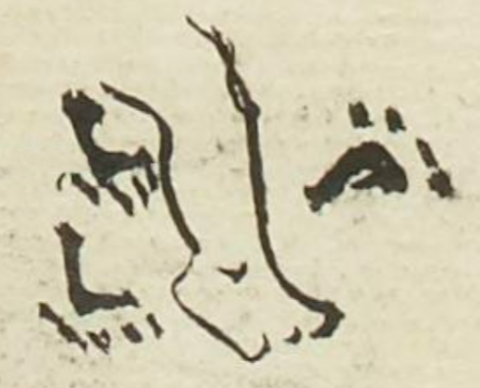Tepalnemitl (MH513r)
The black-line drawing of the compound glyph for the personal or status name Tepalnemitl (perhaps "One Who Lives With Someone Else," attested here as pertaining to a man) shows a (right) human leg in profile, slightly bent, with the foot facing toward the viewer's right. A small mark indicates an ankle bone. To the left of this leg are two footprints, heading downward, and a third footprint appears to the right of the leg, going away to the right. The intention seems to be to have the leg represent someone who is surrounded by others, someone who lives (nemi) with others (tepal). The absolutive ending (-tl) added at the end of the name seems to be making a noun ("someone who") out of the verb and adverb. Nemini means resident; perhaps nemitl means someone who walks or goes about.
Stephanie Wood
This is a personal name, preceded in the gloss by a Christian first name (Toribio). He may have been named after Toribio de Benavente, also known as Motolinia ("One Who is Poor or Afflicted"). This was the first word he learned in Nahuatl, and he went on to learn the language well. He lived in the monastery in Huejotzingo. Doing a quick search for the name "Toribio" will produce an impressive result.
Regarding the Nahua name, the footprints here seems to stand for the word tepal (with others or surrounded by others) part of the name by placing people on the landscape in close proximity to the person with the prominent leg. However, we have already seen footprints used to represent the verb nemi, too. Footprint glyphs have a wide range of translations. In this collection, so far, we can attest to yauh, xo, pano, -pan, paina, temo, nemi, quetza, otli, iyaquic hualiloti, huallauh, tepal, tetepotztoca, totoco, otlatoca, -tihui, and the vowel "o." Other research (Herrera et al, 2005, 64) points to additional terms, including: choloa, tlaloa, totoyoa, eco, aci, quiza, maxalihui, centlacxitl, and xocpalli.
Stephanie Wood
doro tepalnemitl
Toribio Tepalnamitl
Stephanie Wood
1560
Jeff Haskett-Wood
huellas, footprints, steps, pasos, icximachiyotl, xocpalli, icxipamitl, vivir junto, con otros, nemitl, nombres de hombres

tepal nemi, one who lives with someone else, https://nahuatl.wired-humanities.org/content/tepal-nemi
tepal, in relation to another person, https://nahuatl.wired-humanities.org/content/tepal
nemi, to go along, to go around, https://nahuatl.wired-humanities.org/content/nemi
nemini, a resident, https://nahuatl.wired-humanities.org/content/nemini
El Que Vive Con Otros
Stephanie Wood
Matrícula de Huexotzinco, folio 513r, World Digital Library, https://www.loc.gov/resource/gdcwdl.wdl_15282/?sp=105&st=image
This manuscript is hosted by the Library of Congress and the World Digital Library; used here with the Creative Commons, “Attribution-NonCommercial-ShareAlike 3.0 License” (CC-BY-NC-SAq 3.0).




